Mohammed Aisha’s eyes were swollen as she sat on the chair for a long moment. It was evident that she has not been happy for a while now. It was not long that Aisha attested to that fact. Even without a soothsayer, she believes the water from the only stream serving her community stole her unborn children. But how?
Gurfata, an agrarian and “forgotten” community in Gwagwalada area council in Nigeria’s capital, Abuja, has all its takes for pregnant women to lose pregnancies and for other residents to die prematurely.
At 32, Aisha has suffered two miscarriages. The first came three months into her pregnancy—it started with sharp pains, then blood. The second followed the same cruel pattern. Doctors confirmed her worst fear: the water she drank was poisoning her.
“I had two miscarriages, and we were told they were caused by the water I drank. My husband went to the clinic for a test, where they confirmed that the water we were drinking was causing infections in our bodies,” she said.
Despite this discovery, her husband later married a second and third wife but it ended in tears and agony for the family. The two other wives died during childbirth.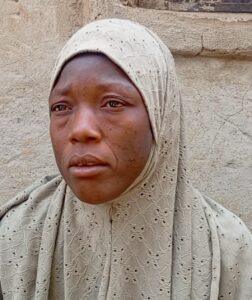
Two miscarriages. Two co-wives’ death—this is not the life she had once dreamed of.
“During childbirth, when they tried to transport them to the hospital, they couldn’t make it in time. There are no doctors or medical facilities here, and complications arose during delivery,” a teary Aisha recalled.
She added that although they attended antenatal care, some babies were in a breech position, making delivery difficult. Sadly, the lack of adequate medical support in the agrarian community contributed to the deaths of her co-wives before they could receive help.
“We were three in the household, but now I am the only one,” she lamented.
The past six months alone had seen the deaths of multiple pregnant women in the community, their babies also died before they could take their first breath.
Adamu Pada, the chief of the village, is helpless and doesn’t seem to have any hope of getting assistance as he had watched as more and more newly married women suffered repeated miscarriages.
The community head asserted that his subjects are facing a growing maternal health crisis as increasing numbers of women suffer from repeated miscarriages and preventable deaths due to inadequate healthcare services and poor infrastructure.
“Promoting primary health care and ensuring access to clean water would significantly reduce these health issues,” Pada said through an interpreter. “But as long as the primary healthcare system is inadequate and clean water remains scarce, disease outbreaks spread rapidly, and vulnerable groups suffer the most.”
He disclosed that over the past six months, multiple women have died, while the number of miscarriages—particularly among newly married young girls—remains uncountable.
The chief affirmed that children under the age of five and pregnant women are disproportionately affected by the crisis. Stating that the combination of poor healthcare infrastructure and unsanitary conditions has created a perfect storm for the spread of diseases, leaving the community in a constant state of vulnerability.
According to him, women who have been married for more than three years are experiencing recurrent miscarriages, with many pregnancies ending between two and three months. At the moment, over 70 women in the village have experienced miscarriages, with some having suffered such painful loss more than three times in a row.
A severe shortage of healthcare personnel has worsened the crisis, with the community’s only health centre operating with just one worker.
In cases of medical emergencies, the delay in reaching a well-equipped facility often results in fatal consequences, especially for pregnant women. Poor road conditions further exacerbate the issue, making it difficult to transport patients to the nearest general or teaching hospital, which is 10 kilometres away.
Residents at mercy of bad roads, unclean water supply
While the Gwagwalada area council authorities have constructed a nine-kilometre road to help reduce travel time, residents still face significant challenges.
The lack of clean water and proper healthcare facilities has led to widespread health issues, including cholera outbreaks, infections, and skin rashes, particularly among children under five.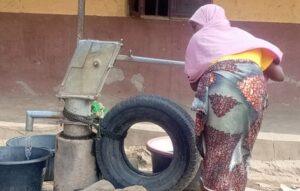
“The community is struggling, and many women lose their lives due to inadequate healthcare,” the village head lamented.
On many occasions, community health workers, with limited experience, have attempted to manage the crisis, but no successful intervention has been made. In emergencies, pregnant women are transported on motorcycles or in cars, often arriving too late for life-saving care.
Pada called on the federal capital territory administration (FCTA) and relevant authorities to take immediate action by improving primary healthcare, providing access to clean water, and ensuring better emergency medical response in the community.
Without urgent intervention, women and children in the community will continue to suffer preventable deaths, he warned.
The Tragic Toll of Neglect in Kaida Sabo community
Twenty-seven-year-old Zuwaira was six months pregnant with what was supposed to be her third child, when things went awry. On the fateful day, she suddenly started bleeding but to her it was thought to just another discomfort of pregnancy.
Minutes snowballed into hours as the bleeding worsened with excruciating pain.
However, before her family could find a motorcycle to take her to a healthcare facility in Gwagwalada town, Zuwaira had already lost too much blood.
Farouk Usman, Zuwaira’s brother, still in shock, struggled to speak about that night. “She kept saying, ‘I don’t want to die, I don’t want to die,’ but we couldn’t do anything,” he recalled his sister’s last moment, his voice breaking.
“By the time we got a car to take her to Gwagwalada, she had stopped talking. By the time we got there, she was gone.”
Zuwaira’s story is not an isolated case. It is one of many in Kaida Sabo, a small rural community in the Gwagwalada area council, Abuja, where pregnancy feels like a gamble with death.
Residents say three to four pregnant women die from pregnancy complications almost every month. Some lose their babies early in pregnancy without warning; others, like Zuwaira, experienced terrible pain with no medical help nearby.
But the crisis in Kaida Sabo does not only affect pregnant women, infants and young children are also dying—sometimes in their sleep or in their mothers’ arms—from preventable diseases like malaria and infections caused by unclean water.
The community does not have a functional hospital. The nearest healthcare centre is miles away, and the roads to get there are in terrible condition.
Read also: Mysterious sleep disorder hits Cross River Community, leaves residents hospitalized
“We don’t even have clean water to drink, let alone for pregnant women to stay healthy,” says Mohammed Boss, another resident, cradling a child, who looks weak from sickness. “Every time it rains, the water we fetch from the well becomes dirty, but we have no choice. We drink it. We bathe our children with it.”
For now, the people of Kaida Sabo are only hoping that someone, somewhere will listen, that help will come before more lives are lost. “We are suffering,” Boss adds. “We are losing our women, our children. We just want to live.”
Communities Poisoned by Its Lifeline – contaminated water with several impurities
In Gurfata and Kaida communities, water is both life and death. Of the five boreholes meant to supply Gurfata, only two, constructed in 1992 –33 years ago — are functional. The newer ones had long since failed. In Kaida, residents survive on a single borehole, leaving many to resort to unclean source of water for consumption and domestic chores.
When the boreholes could not provide, the people turned to the stream. But the stream held secrets invisible to the eye—heavy metals, disease-causing bacteria, and toxic chemicals.
A laboratory analysis of the water revealed the horrifying truth.
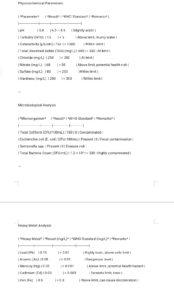
The stream’s water is acidic, turbid, and laced with dangerous contaminants. The levels of lead, arsenic, and mercury exceeded World Health Organization (WHO) safety limits, posing serious risks of neurological damage, kidney failure, and cancer. Fecal bacteria, including E. coli and Salmonella, swarmed in every drop, threatening cholera, typhoid, and diarrhea.
The boreholes offered little relief. Their water, too, is acidic and filled with coliform bacteria. Women who drank it carried the poison within them, their bodies rejecting the life they tried to nurture.
The physicochemical analysis showed that the water is slightly acidic (pH 5.8) and highly turbid, exceeding the WHO safety standards. Nitrate levels, at 60 mg/L, surpassed the WHO’s 50 mg/L limit, indicating possible agricultural runoff contamination.

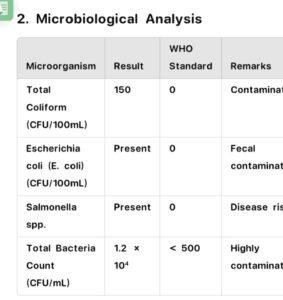
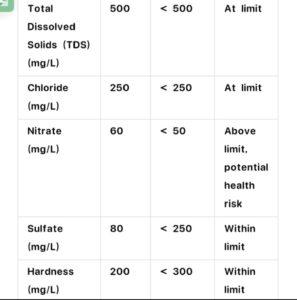
The most critical threats came from microbiological and heavy metal contamination. The analysis found high total coliform bacteria (150 CFU/100mL), E. coli, and Salmonella, all of which signal fecal contamination and serious health risks such as diarrhea, typhoid, and other waterborne diseases.
In addition, the heavy metal tests detected lead (0.15 mg/L), arsenic (0.08 mg/L), and mercury (0.02 mg/L)—all far above WHO’s safe limits. These metals can cause neurological damage, kidney failure, and cancer with prolonged exposure.
The analysis of water from the Gurfata community borehole also did not give any heartwarming results. The results show that the water’s pH level (5.8) is too acidic, while its turbidity (15 NTU) is three times above the WHO limit, indicating murky and impure water. Additionally, nitrate levels (60 mg/L) exceeded WHO’s 50 mg/L standard, posing a potential health risk, especially to infants and pregnant women.
The microbiological analysis confirmed severe bacterial contamination. The water contains 150 CFU/100mL of total coliform bacteria, far above the WHO’s safe limit of zero. More concerning, E. coli and Salmonella were detected, indicating fecal contamination and a high risk of waterborne diseases such as diarrhea, cholera, and typhoid.
Also, the laboratory report revealed infections caused by parasites and bacteria in Kaida river during the rainy season.
As the river dries up every dry season in Kaido Sabo, families are left to dig deep into the earth, hoping to find water hidden beneath the surface. Those who could afford it bought sachet water, which also does not guarantee safety.
The laboratory analysis of the water from the community uncovered the presence of harmful parasites and bacteria, highlighting a growing public health concern.
The findings, which include infections caused by Balantidium coli, Trichomonas vaginalis, and heavy growth of Enterobacter spp and Escherichia coli, point to unsanitary living conditions and inadequate access to clean water and healthcare in the community.
The microscopy results confirmed the presence of Balantidium coli, a parasite known to cause gastrointestinal infections, and Trichomonas vaginalis, a sexually transmitted parasite that can lead to reproductive health issues.
Additionally, bacterial cultures revealed heavy growth of Enterobacter spp and Escherichia coli (E. coli) after 24 hours of incubation at 37°C. These bacteria are often associated with urinary tract infections, gastrointestinal illnesses, and other serious health complications.
The findings are particularly concerning for vulnerable groups, including children and pregnant women, who are more susceptible to severe complications from such infections.
Polluted water crisis puts maternal, child health at grave risk, warns health expert
Amarachi Kalu, the chief executive officer (CEO) of Thriving Up Initiative, described the findings as “alarming,” highlighting the urgent need for intervention to prevent life-threatening infections, pregnancy complications, and long-term developmental challenges in children.
Kalu, who works with international and local financial institutions to implement interventions that save thousands of newborn lives and improve the health and development outcomes of babies in Nigeria, affirmed that the water samples tested positive for E. coli, Salmonella, and high levels of total coliforms, indicating significant fecal contamination.
She noted that the pathogens can cause severe infections, sepsis, and complications during pregnancy, putting both mothers and babies at risk. The health expert added that even more concerning is the detection of toxic levels of heavy metals, including lead, arsenic, mercury, and cadmium.
She explained that the substances are linked to miscarriages, stillbirths, preterm births, and neurological damage in newborns. “Continued exposure to this contaminated water will lead to increased maternal deaths, poor birth outcomes, and long-term health challenges for children,” warned Amarachi
Kalu emphasised that access to clean and safe water is a fundamental human right and a critical determinant of maternal and child survival. “Ensuring universal access to clean water is not just a necessity; it is a basic human right and a matter of life and death for mothers and their babies,” she stated.
To address the crisis, Kalu called for urgent action, including decontamination of water sources, promotion of home water treatment strategies, and enhanced healthcare screening for waterborne infections in pregnant women.
She also stressed the need for sustainable solutions, such as improved water infrastructure, enforcement of government policies, and community education on water safety.
Nigeria’s poor spending on water and healthcare leaves FCT residents in crisis
Despite significant budgetary allocations, Nigeria’s federal government has consistently underperformed in delivering essential services such as clean water and healthcare, leaving residents of the FCT and beyond in dire conditions.
Recent data reveals alarming gaps between budgeted funds and actual expenditures, raising questions about the government’s commitment to addressing critical infrastructure and public health needs.
In 2024, the federal government budgeted N2.491 trillion for the Ministry of Water Resources but spent only N92.413 billion—a mere 3.71% of the allocated funds.
This pattern of underutilisation is not new. In 2023, N230.91 billion was budgeted for water resources capital expenditure, but only N56.9 billion was utilised. Also, in 2022, only N68.8 billion of the N163.5 billion budget was spent.
The consequences of this underinvestment are stark. According to the National Bureau of Statistics (NBS), 46% of households in the FCT lack access to clean drinking water, and 63% lack access to sanitary facilities. These figures are particularly troubling given that the FCT is Nigeria’s capital and should ideally serve as a model for development.
At the local level, the FCT’s 2024 budget for water provision also raises concerns. While N8.5 billion was allocated for the recurrent expenditure of the FCT Water Board and N3 billion for capital expenditure, the impact of these funds remains questionable. Similarly, the FCT Rural Water Supply and Sanitation Agency received a recurrent budget of N865.5 million, but its effectiveness is yet to be seen.
Healthcare: A similar story of neglect
The healthcare sector has fared no better. In 2023, the federal government budgeted N448 billion for health sector capital expenditure but released only N120 billion, with just N77.4 billion utilized. In 2022, N74.2 billion of the N207 billion budgeted was spent.
In 2024, the Federal Ministry of Health recorded a budget performance of just 40.50%, spending only N923 billion of its N2.2 trillion budget. Even more concerning is the FCT’s complete lack of capital expenditure provision for the Primary Healthcare Development Board and the Area Council Primary Healthcare Department in 2024, leaving primary healthcare services severely underfunded.
A call for accountability and action
The persistent underfunding of water and healthcare infrastructure has left millions of Nigerians, including FCT residents, vulnerable to preventable diseases, poor maternal and child health outcomes, and a lack of basic sanitation.
Experts warn that without urgent intervention, the situation will continue to deteriorate, exacerbating poverty and inequality.
“The government’s poor spending on water and healthcare is a betrayal of its citizens,” said a public health advocate.
“Clean water and healthcare are not luxuries; they are fundamental human rights. The government must prioritize these sectors and ensure that allocated funds are fully utilized to make a meaningful impact.”
As Nigeria grapples with these challenges, residents are calling for greater transparency, accountability, and action from their leaders. Without immediate and sustained efforts to address these gaps, the dream of universal access to clean water and quality healthcare will remain out of reach for millions.
Nigerian Health Minister Urges Citizens to Hold Government Accountable for Improved Healthcare
The Minister of Health and Social Welfare, Ali Pate, had called on Nigerians to hold the government at all levels accountable for delivering improved healthcare services and basic social services. Pate made the appeal in Abuja during the maiden edition of the Nigeria Health Sector-Wide Joint Annual Review (JAR) in November 2024
The JAR, which serves as a platform for evaluating the progress, challenges, and opportunities in Nigeria’s healthcare sector, aims to advance the principles of the sector-wide approach (SWAp). Pate emphasized that the initiative provides an opportunity for all stakeholders to reflect on the strides made and identify areas for improvement.
“We want you to hold us, as well as your state and local governments, accountable for providing improved quality healthcare services and basic services that we need as a people to create a healthier nation,” Pate stated. His remarks align with the broader vision set by President Muhammadu Buhari’s administration to strengthen the country’s healthcare system.
Building on the efforts of past health ministers, Pate acknowledged the contributions of his colleagues, including Dr. Tunji Alausa and Dr. Ishaq Alausa, as well as leaders from various agencies in the health sector.
The minister also highlighted key improvements in the country’s health outcomes. According to the pre-population health outlook report from the soon-to-be-reviewed Nigeria Demographic and Health Survey (NDHS) conducted in 2023, the under-five mortality rate has decreased by 16.7% between 2018 and 2023.
Pate also pointed to significant advancements in combating infectious diseases, citing a 40% reduction in diarrheal diseases, a 24% decrease in Tuberculosis, and a 12% drop in HIV cases.
“Despite the challenges, Nigeria is making progress, and with continued political commitment, we can accelerate in the right direction,” he stated.
Also, the minister, in March this year called for stronger collaboration among the three tiers of government to enhance primary healthcare delivery at the grassroots level.
During the National Stakeholders’ Engagement on Accelerating Primary Health Care in Nigeria, Professor Ali Pate emphasized the importance of local government autonomy in strengthening healthcare delivery.
He stressed that primary healthcare goes beyond physical structures, requiring coordinated efforts among federal, state, and local governments.
“Local governments will now play a greater role, but they cannot do it alone. Standards, funding mechanisms, and technical support must be harmonized to ensure sustainable healthcare delivery,” the minister stated.
Prof Pate commended key stakeho







